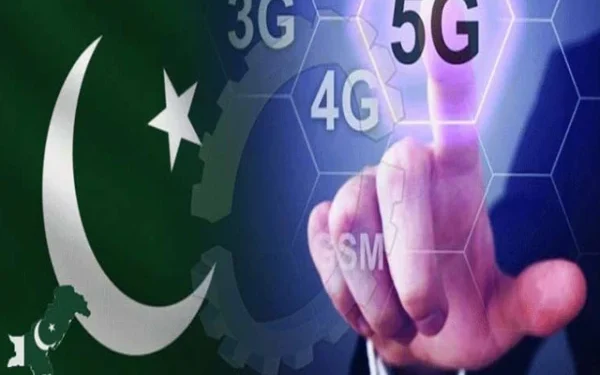Islamabad – In a major development towards advancing Pakistan’s digital infrastructure, the federal government has approved the reconstitution of a high-level advisory committee to expedite the spectrum auction process. This move aims to facilitate the implementation of fifth-generation (5G) technology, improve nationwide network coverage, and enhance the quality of mobile broadband services.
The decision was announced following a detailed briefing to the Economic Coordination Committee (ECC) by the Ministry of Information Technology and Telecommunication (MoITT). The ministry highlighted that efficient utilization of the frequency spectrum is vital for expanding the telecom network, increasing teledensity, and meeting the growing demand for high-speed internet access in the country.
Background: Why 5G Matters for Pakistan
5G technology is considered a transformational leap in telecommunications, enabling ultra-fast internet speeds, low latency, and massive device connectivity. It has applications across industries, including smart cities, artificial intelligence (AI), telemedicine, autonomous transportation, e-commerce, and the Internet of Things (IoT).
For Pakistan, with a rapidly growing population and a youth-dominated demographic, 5G can play a crucial role in bridging the digital divide, boosting entrepreneurship, enhancing digital governance, and enabling innovation in agriculture, education, and healthcare sectors.
Current Challenges in Pakistan’s Spectrum Utilization
According to the MoITT, Pakistan’s commercial cellular service currently uses spectrum bands 700 MHz, 2300 MHz, 2600 MHz, and 3500 MHz at levels much lower than the global standard.
The ministry noted that spectrum auctions have been conducted in the past – specifically in 2014, 2016, 2017, and 2021 – to allocate frequencies to cellular network operators. However, the spectrum still remains underutilized, creating a gap in service quality and network reach compared to international benchmarks.
Reconstitution of the High-Level Advisory Committee
The ECC was informed that the upcoming spectrum auction would be carried out under the supervision of the reconstituted advisory committee, in line with the directives of the Prime Minister and the Federal Cabinet.
Originally formed on November 6, 2023, the committee underwent amendments on June 28, 2024, to make it more effective and inclusive. In response to a request from the Ministry of Industries and Production, the Special Assistant to the Prime Minister (SAPM) on Industries and Production has now been included as a member.
The revised committee composition ensures representation from:
- Relevant federal ministers
- Secretaries of key ministries
- Special Assistants to the Prime Minister
- Regulatory and technical experts
Goals of the Reconstituted Committee
The restructured committee will play a central role in:
- Overseeing the spectrum auction process to ensure transparency, efficiency, and adherence to global telecom standards.
- Maximizing spectrum utilization for better coverage in underserved and rural areas.
- Improving quality of service (QoS) for mobile broadband users.
- Encouraging private-sector investment in telecom infrastructure and network modernization.
- Laying the foundation for 5G deployment, which is expected to transform multiple sectors of Pakistan’s economy.
Impact on Telecom Operators and Consumers
The ECC and MoITT emphasized that the successful completion of the spectrum auction will create opportunities for cellular network operators to upgrade infrastructure and roll out advanced services.
For consumers, the benefits will include:
- Higher internet speeds for streaming, gaming, and online learning.
- More reliable connectivity in rural and remote areas.
- Better call quality and reduced network congestion.
- Access to next-generation applications such as augmented reality (AR), virtual reality (VR), and smart home solutions.
Economic and Digital Transformation Benefits
According to industry experts, the expansion of mobile broadband services and the rollout of 5G technology can significantly contribute to:
- Economic growth through the creation of new jobs in the ICT sector.
- Increased foreign investment as international tech companies explore opportunities in Pakistan.
- Enhanced e-commerce and fintech growth, enabling secure and faster transactions.
- Support for startups and innovation hubs, giving young entrepreneurs access to global digital markets.
The World Bank and GSMA Intelligence have previously stated that every 10% increase in mobile broadband penetration can lead to a 1–1.5% increase in GDP growth for developing countries – a statistic that underscores the strategic importance of Pakistan’s 5G initiative.
Government’s Digital Pakistan Vision
The reconstitution of the advisory committee aligns with the Digital Pakistan Vision, which aims to transform Pakistan into a digitally empowered economy. The government has already introduced initiatives such as:
- National Broadband Policy 2021 for affordable internet access.
- Digital Skills Training Programs for the youth.
- Public-private partnerships to accelerate fiber-optic network expansion.
- E-governance platforms to improve public service delivery.
Next Steps in the Spectrum Auction Process
The MoITT has indicated that the committee will soon finalize:
- Auction timelines and procedures
- Pricing models and payment terms for spectrum allocation
- Technical requirements for network operators
- Service coverage obligations to ensure rural inclusion
The goal is to conclude the auction process swiftly, allowing telecom operators to begin 5G trials and initial rollouts in major urban centers, followed by gradual expansion to semi-urban and rural areas.
Conclusion: A Leap Towards a Digitally Connected Pakistan
The government’s move to reconstitute the spectrum auction advisory committee is a critical step in Pakistan’s journey towards 5G readiness. By ensuring efficient spectrum utilization, enhancing telecom infrastructure, and creating a clear roadmap for next-generation connectivity, Pakistan is positioning itself to compete in the global digital economy.
The initiative is expected to bring widespread socio-economic benefits, improve technological accessibility, and open doors for innovation, ultimately contributing to national growth and international competitiveness.
If implemented effectively, Pakistan’s leap into the 5G era could mirror the transformational impact of mobile broadband witnessed in other emerging economies, making the vision of a truly Digital Pakistan a tangible reality.

























